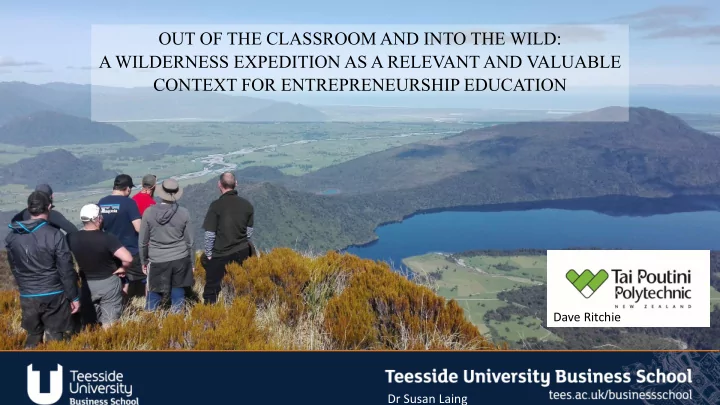

OUT OF THE CLASSROOM AND INTO THE WILD: A WILDERNESS EXPEDITION AS A RELEVANT AND VALUABLE CONTEXT FOR ENTREPRENEURSHIP EDUCATION Dave Ritchie Dr Susan Laing Dr Susan Laing
Wh Why? Looking for innovation and new contexts for entrepreneurial learning.
Ef Effe fective En Entrepr prene neur urial Educ ducation n looks s for… Go Good Wi Wilderness Education has… - Real World Uncertainty Weather, new and novel skills to be learned quickly, (Pittaway, 2007; Bagheri, 2011, Tosey, 2015) environmentally imposed timelines Mindfulness of Team Process Problems that cannot be solved and tasks that cannot be (Ensley, 2002; Burnett, 2016) accomplished alone Identity Formation The pressure of constant contact with team mates and (Sexton, 1984; Bagheri 2011; Loi, 2016) the lack of opportunity to “hide”, structured feedback
Hokitika
Results Re Effe Ef fective En Entrepr prene neur urial Educ ducation n looks s for… Mu Multi ti Disciplinary Expediti tion (MD MDEx) show owed… Real World Uncertainty HIGH (Pittaway, 2007; Bagheri, 2011, Tosey, 2015) Generated by low information at beginning, task novelty and novice errors the programme seemed to be in a constant state of emergence Mi Mindfulness of Team Process LOW LO (E (Ensle ley, 2002; Burnett, 2016) Reflective time dominated by leadership style and identify formation – Re improvemen imp ement comes mes by shift iftin ing reflec flectiv ive e focus to team eam proces ess an and memb member ership ip skills ills Identity Formation HIGH (Sexton, 1984; Bagheri 2011; Loi, 2016) Appeared most commonly as auditing of learned behaviours and a rejuvenation of intrinsic motivation. Spurred by dealing with and overcoming uncertainty.
The Weight of Leadership? OR The Absence of Membership?
Breaking down membership behaviour Psychological Safety Leadership intentionally creates an environment where both task and relationship conflict can be addressed in open and secure forums and in certain contexts “failure” is acceptable or even desirable. Knowledge Building and Sharing All members appreciate and enact sharing knowledge, even seemingly tiny pieces of information can make a difference to a team shared mental model, efficiency and understanding. Relationships and Social Trust Members continually act to make life easier for their teammates with small acts of gratitude or service. Barsade (2014) refers to these acts of companionate love.
Entrepreneurship is fundamentally a design process (Neck and Greene, 2011) Design has a method, fundamental to which is the mindfulness of team process (Burnett, 2016) Understanding, applying and acting on team process is critical to teams that are; exploring/innovating/creating/designing So how do we do this in the context of entrepreneurship education?
References Bagheri, A. & Pihie, Z. (2011). Entrepreneurial leadership: towards a model for learning and development. Human Resource Development International , 14(4), pp. 447-463. Neck, H. M. & Greene, P. G. (2011) Entrepreneurship education: known worlds and new frontiers, Journal of Small Business Management, Vol. 49 (1): 55-70. Burnett, B. (2016) Design Thinking; Method not Magic. Stanford Online Webinar; https://www.youtube.com/watch?v=vSuK2C89yjA&t=330s Barsade, S, O'Neill, O. (2014) What’s love got to do with it? Administrative Science Quarterly, 59 (4) p551-598 Ensley, M. (2002). Understanding the dynamics of new venture top management teams: cohesion, conflict, and new venture performance. Journal of Business Venturing, 17(4), pp. 365-386. Loi, M. Di Guardo, M. & Castriotta, M. (2016). The theoretical foundations of entrepreneurship education: how co-citations are shaping the field. International Small Business Journal, 34(7), pp.948-971. Pittaway, L. & Cope, J. (2007). Simulating entrepreneurial learning: integrating experiential and collaborative approaches to learning. Management Learning, 38(2), pp. 211-233.
Recommend
More recommend